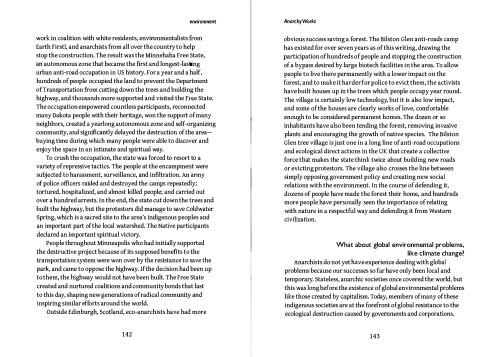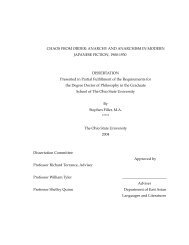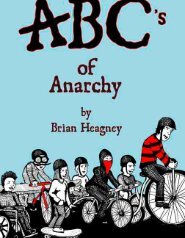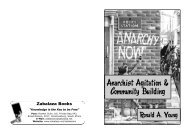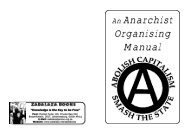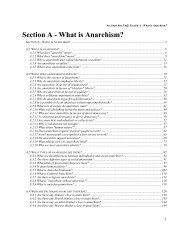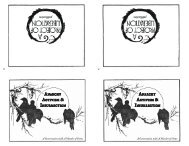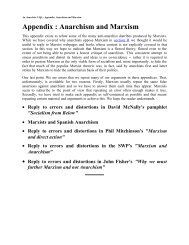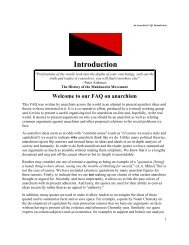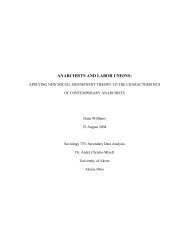Anarchy Works.pdf - Infoshop.org
Anarchy Works.pdf - Infoshop.org
Anarchy Works.pdf - Infoshop.org
Create successful ePaper yourself
Turn your PDF publications into a flip-book with our unique Google optimized e-Paper software.
environment<br />
<strong>Anarchy</strong> <strong>Works</strong><br />
work in coalition with white residents, environmentalists from<br />
Earth Firstl, and anarchists from all over the country to help<br />
stop the construction. The result was the Minnehaha Free State,<br />
an autonomous zone that became the first and longest-lasting<br />
urban anti-road occupation in US history. For a year and a half,<br />
hundreds of people occupied the land to prevent the Department<br />
of Transportation from cutting down the trees and building the<br />
highway, and thousands more supported and visited the Free State.<br />
The occupation empowered countless participants, reconnected<br />
many Dakota people with their heritage, won the support of many<br />
neighbors, created a yearlong autonomous zone and self-<strong>org</strong>anizing<br />
community, and significantly delayed the destruction of the areabuying<br />
time during which many people were able to discover and<br />
enjoy the space in an intimate and spiritual way.<br />
To crush the occupation, the state was forced to resort to a<br />
variety of repressive tactics. The people at the encampment were<br />
subjected to harassment, surveillance, and infiltration. An army<br />
of police officers raided and destroyed the camps repeatedly;<br />
tortured, hospitalized, and almost killed people; and carried out<br />
over a hundred arrests. In the end, the state cut down the trees and<br />
built the highway, but the protestors did manage to save coldwater<br />
Spring, which is a sacred site to the area's indigenous peoples and<br />
an important part of the local watershed. The Native participants<br />
declared an important spiritual victory.<br />
People throughout Minneapolis who had initially supported<br />
the destructive project because of its supposed benefits to the<br />
transportation system were won over by the resistance to save the<br />
park, and came to oppose the highway. If the decision had been up<br />
to them, the highway would not have been built. The Free State<br />
created and nurtured coalitions and community bonds that last<br />
to this day, shaping new generations of radical community and<br />
inspiring similar efforts around the world.<br />
Outside Edinburgh, Scotland, eco-anarchists have had more<br />
obvious success saving a forest. The Bilston Glen anti-roads camp<br />
has existed for over seven years as of this writing, drawing the<br />
participation of hundreds of people and stopping the construction<br />
of a bypass desired by large biotech facilities in the area. To allow<br />
people to live there permanently with a lower impact on the<br />
forest, and to make it harder for police to evict them, the activists<br />
have built houses up in the trees which people occupy year round.<br />
The village is certainly low technology, but it is also low impact,<br />
and some of the houses are dearly works of love, comfortable<br />
enough to be considered permanent homes. The dozen or so<br />
inhabitants have also been tending the forest, removing invasive<br />
plants and encouraging the growth of native species. The Bilston<br />
Glen tree village is just one in a long line of anti-road occupations<br />
and ecological direct actions in the UK that create a collective<br />
force that makes the state think twice about building new roads<br />
or evicting protestors. The village also crosses the line between<br />
simply opposing government policy and creating new social<br />
relations with the environment. In the course of defending it,<br />
dozens of people have made the forest their home, and hundreds<br />
more people have personally seen the importance of relating<br />
with nature in a respectful way and defending it from Western<br />
civilization.<br />
What about global environmental problems.<br />
like climate changel<br />
Anarchists do not yet have experience dealing with global<br />
problems because our successes so far have only been local and<br />
temporary. Stateless, anarchic societies once covered the world, but<br />
this was long before the existence of global environmental problems<br />
like those created by capitalism. Today, members of many of these<br />
indigenous societies are at the forefront of global resistance to the<br />
ecological destruction caused by governments and corporations.<br />
142<br />
143


